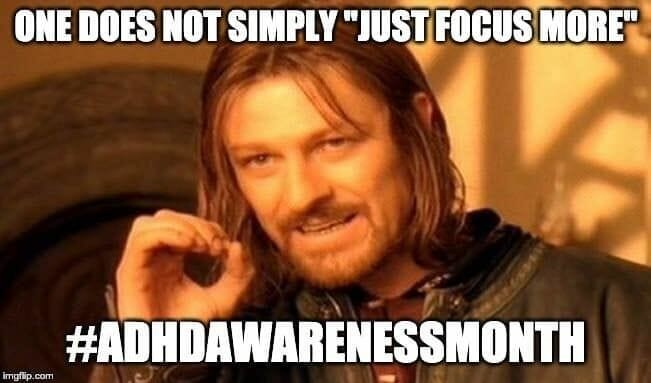ADHD Awareness Month

Student Accessibility Services Acknowledges October as ADHD Awareness Month
The goal of ADHD Awareness Month is to raise awareness of ADHD, remove the stigma, and highlight the available supports that enable individuals and families to thrive with ADHD.
During the month of October, SAS is highlighting information about ADHD, resources, blogs, and ways to learn more about ADHD.
Student Accessibility Services’ Podcast on ADHD:
Check out Student Accessibility Services’ upcoming Podcast, “ADHD and the College Student Experience” scheduled to be released on October 16th. Join Mandi Gearhart and Amy Sturgeon from SAS as they talk with a UMaine student about life, school, and living with ADHD.
Interested in listening to more podcasts about ADHD?
Check out TADD Talks , sponsored by the Attention Deficit Disorder Association:
What’s a TADD Talk?
We Talk about ADD every day for the entire month of October!
You’ve heard of “TED” talks? Silly question. Everyone’s heard of TED talks.
TADD Talks are an ADHD-friendly riff on “TED talks.” TED talks are 18 minute presentations on a variety of interesting subjects, TADD recordings are only 9 minutes long (we do have a shorter attention span, you know!) on interesting ADHD topics.
The speaker lineup is always amazing! Many professionals everyone will recognize as “the best of the best” will be address virtually every topic that could be of interest to adults with ADHD throughout ADHD Awareness Month this October.
To sign up for TADD talks and to learn more check out ADD.org’s TADD Talks 2020 page

Information about ADHD
7 facts about ADHD (According to ADHDAwarenessMonth.org)
ADHD is Real
- Nearly every mainstream medical, psychological, and educational organization in the United States long ago concluded that Attention-Deficit/Hyperactivity Disorder (ADHD) is a real, brain-based medical disorder. These organizations also concluded that children and adults with ADHD benefit from appropriate treatment. [1,2,3,4,5,6,7]
ADHD is a Common, Non-Discriminatory Disorder
- ADHD is a non-discriminatory disorder affecting people of every age, gender, IQ, religious and socio-economic background.
- In 2011, the Centers for Disease Control and Prevention reported that the percentage of children in the United States who have ever been diagnosed with ADHD is now 9.5%. [8] Boys are diagnosed two to three times as often as girls.
- Among adults, the Harvard/NIMH National Comorbidity Survey Replication found 4.4% percent of adults, ages 18-44 in the United States, experience symptoms and some disability. [9]
- ADHD, AD/HD, and ADD all refer to the same disorder. The only difference is that some people have hyperactivity and some people don’t.
Diagnosing ADHD is a Complex Process
- In order for a diagnosis of ADHD to be considered, the person must exhibit a large number of symptoms, demonstrate significant problems with daily life in several major life areas (work, school, or friends), and have had the symptoms for a minimum of six months.
- To complicate the diagnostic process, many of the symptoms look like extreme forms of normal behavior. Additionally, a number of other conditions resemble ADHD. Therefore, other possible causes of the symptoms must be taken into consideration before reaching a diagnosis of ADHD.
- What makes ADHD different from other conditions is that the symptoms are excessive, pervasive, and persistent. That is, behaviors are more extreme, show up in multiple settings, and continue showing up throughout life.
- No single test will confirm that a person has ADHD. Instead, diagnosticians rely on a variety of tools, the most important of which is information about the person and his or her behavior and environment. If the person meets all of the criteria for ADHD [10,11], they will be diagnosed with the disorder.
Other Mental Health Conditions Often Occur Along With ADHD
- Up to 30% of children and 25-40% of adults with ADHD have a co-existing anxiety disorder. [12]
- Experts claim that up to 70% of those with ADHD will be treated for depression at some point in their lives. [13]
- Sleep disorders affect people with ADHD two to three times as often as those without it. [14]
ADHD is Not Benign
ADHD is not benign.[15] Particularly when the ADHD is undiagnosed and untreated, ADHD contributes to:
- Problems succeeding in school and successfully graduating. [16,17]
- Problems at work, lost productivity, and reduced earning power. [18,19,20,21]
- Problems with relationships. [22,23]
- More driving citations and accidents. [24,25,26,27]
- Problems with overeating and obesity. [28,29,30,31]
- Problems with the law. [32,33]
- According to Dr. Joseph Biederman, professor of psychiatry at Harvard Medical School, ADHD may be one of the costliest medical conditions in the United States: “Evaluating, diagnosing and treating this condition may not only improve the quality of life, but may save billions of dollars every year.” [34]
ADHD is Nobody’s FAULT
- ADHD is NOT caused by moral failure, poor parenting, family problems, poor teachers or schools, too much TV, food allergies, or excess sugar. Instead, research shows that ADHD is both highly genetic (with the majority of ADHD cases having a genetic component), and a brain-based disorder (with the symptoms of ADHD linked to many specific brain areas). [35]
- The factors that appear to increase a child’s likelihood of having the disorder include gender, family history, prenatal risks, environmental toxins, and physical differences in the brain. [36]
ADHD Treatment is Multi-Faceted
- Currently, available treatments focus on reducing the symptoms of ADHD and improving functioning.
- Treatments include medication, various types of psychotherapy, behavioral interventions, education or training, and educational support.
- Usually a person with ADHD receives a combination of treatments. [37,38]

